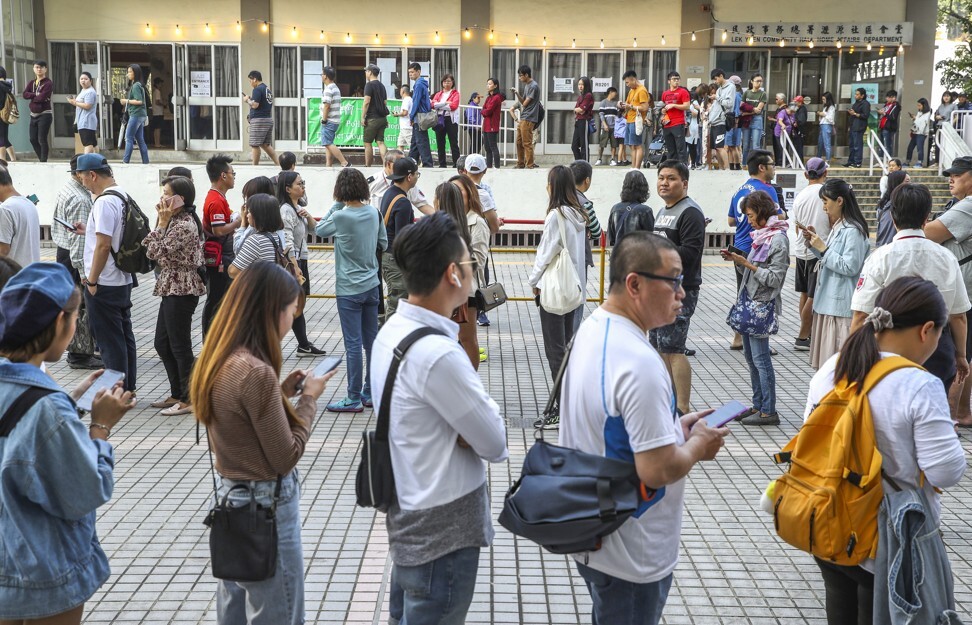
Hong Kong election authority rejects government’s special-queue proposal for vulnerable voters
- Electoral Affairs Commission dismisses government call for elderly, pregnant and disabled voters to have dedicated lane for September’s Legislative Council elections
- Its chairman says support is already offered for those who need it after issue came to the fore amid record turnout at district council polls last year
The Electoral Affairs Commission’s decision on Thursday raised eyebrows after a dedicated lane at polling stations was repeatedly backed by pro-government parties and even Secretary for Constitutional and Mainland Affairs Erick Tsang Kwok-wai, who made a last-ditch appeal for the provision a day before.
Security law opposition ‘raises suspicions’ about election hopefuls
Amid a record turnout of 71.2 per cent, lengthy queues formed outside polling stations across the city, leading some to raise concerns for the welfare of elderly, pregnant and disabled voters.
Mr Justice Barnabas Fung Wah, the commission’s chairman, brushed aside the pleas and decided against introducing the change, drawing immediate condemnation from Beijing-friendly politicians, one of whom described the snub as “extremely irresponsible”.
“I think we have thought of the most practical means, and we do care for people with special needs,” Fung said.
Fung’s remarks came as the commission released its guidelines for the Legislative Council elections on September 6, which more than 4 million residents are eligible to vote in, with all 70 seats in the city’s legislature up for grabs.
Under existing arrangements continuing for September, the public queues in a single line outside each polling station, and will be triaged to cast their preference through different desks, which are assigned a section of the constituency’s electoral register grouped according to the alphabet prefix of voters’ identity cards.
Fung defended the current practice as fair, adding it would be hard to arrange an extra queue for the elderly given the limited space outside polling stations.
Record 401,900 Hongkongers sign up to vote following opposition campaign
But he said electoral staff in September would pick out voters in need from the queue and fast-track them to desks that were empty or quiet, to reduce waiting times for them.
Thousands of chairs will also be sourced to provide seating at more than 600 poll stations across Hong Kong for the elderly as well those who are pregnant, unwell or have a physical disability, according to the commission.
Starry Lee Wai-king, chairwoman of the Democratic Alliance for the Betterment and Progress of Hong Kong, of the pro-government camp, slammed the commission’s arrangements.
“The commission’s guidelines do not address unfairness arising from last November’s election,” Lee said, referring to complaints that some elderly had to wait a long time.
“We think it is extremely irresponsible … and [the commission] has failed in its statutory duties.”
But Democratic Party chairman Wu Chi-wai said the commission had acted “with common sense”, suggesting that creating a special queue for some could lead to conflict.
In previous elections in the city, pro-establishment groups, which tend to draw much of their support from the elderly, have been seen hiring vehicles to pick up older people and take them to the ballot box for free.
Some Beijing-friendly politicians had said the long queues in the November polls had put senior voters off from making the trip.

He said the power to rule whether someone was fit to run rests solely on returning officers, who are civil servants drafted in from the Home Affairs Bureau.
“There is no guideline we can give them,” Fung said.
Candidates and members of the public who were dissatisfied with the rulings could launch election petitions, Fung said, although the system had been criticised for taking years to resolve disputes.
Anti-government plan to win key seats in Hong Kong legislature suffers blow
The authorities also ruled out setting up a special poll station at the airport for voters returning from overseas.
Chief electoral officer Alan Yung Ying-fai said it was voters’ responsibility to calculate when best to return for the election. “Perhaps they will play safe and return to Hong Kong in mid-August,” Yung said.

